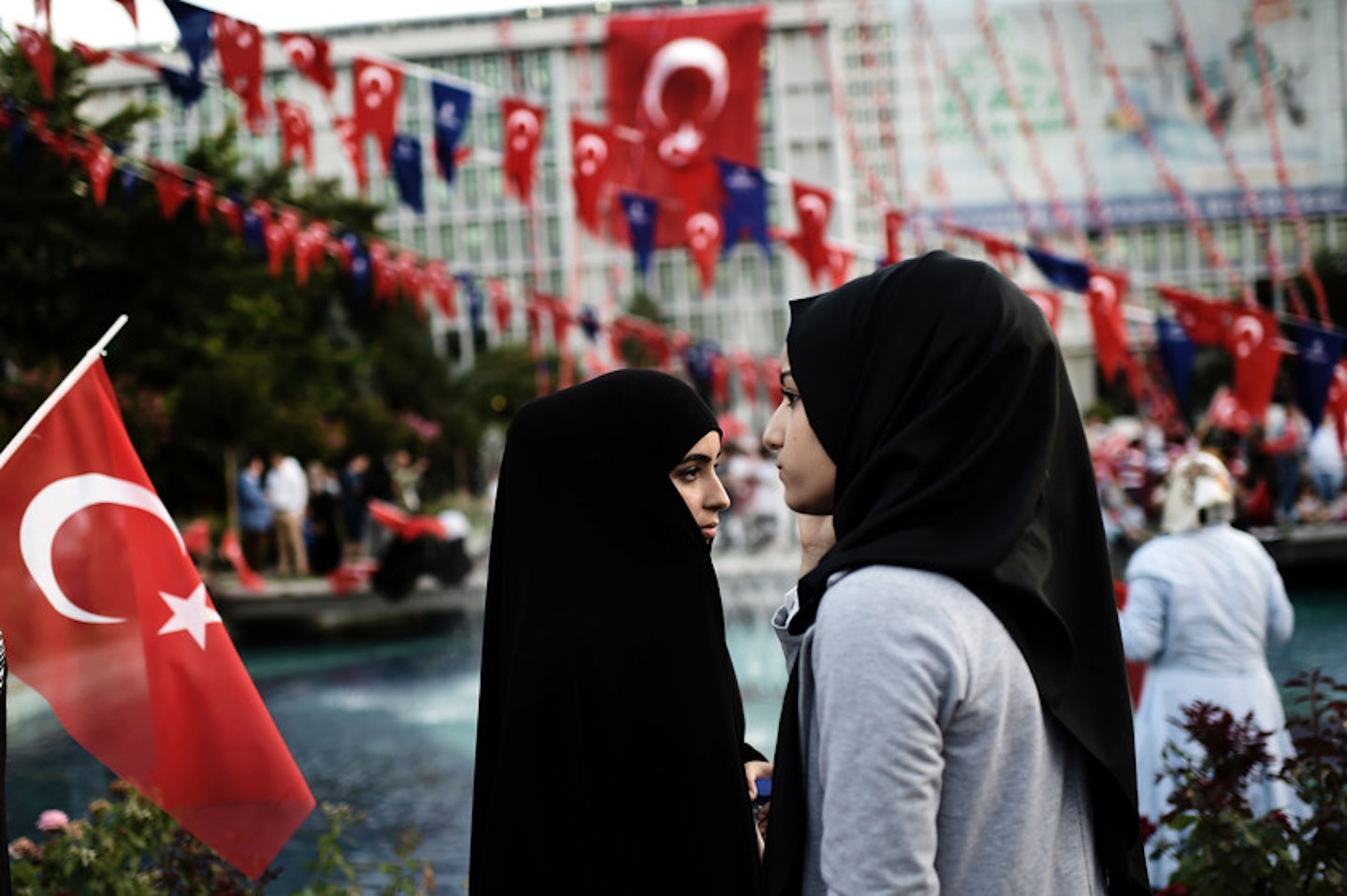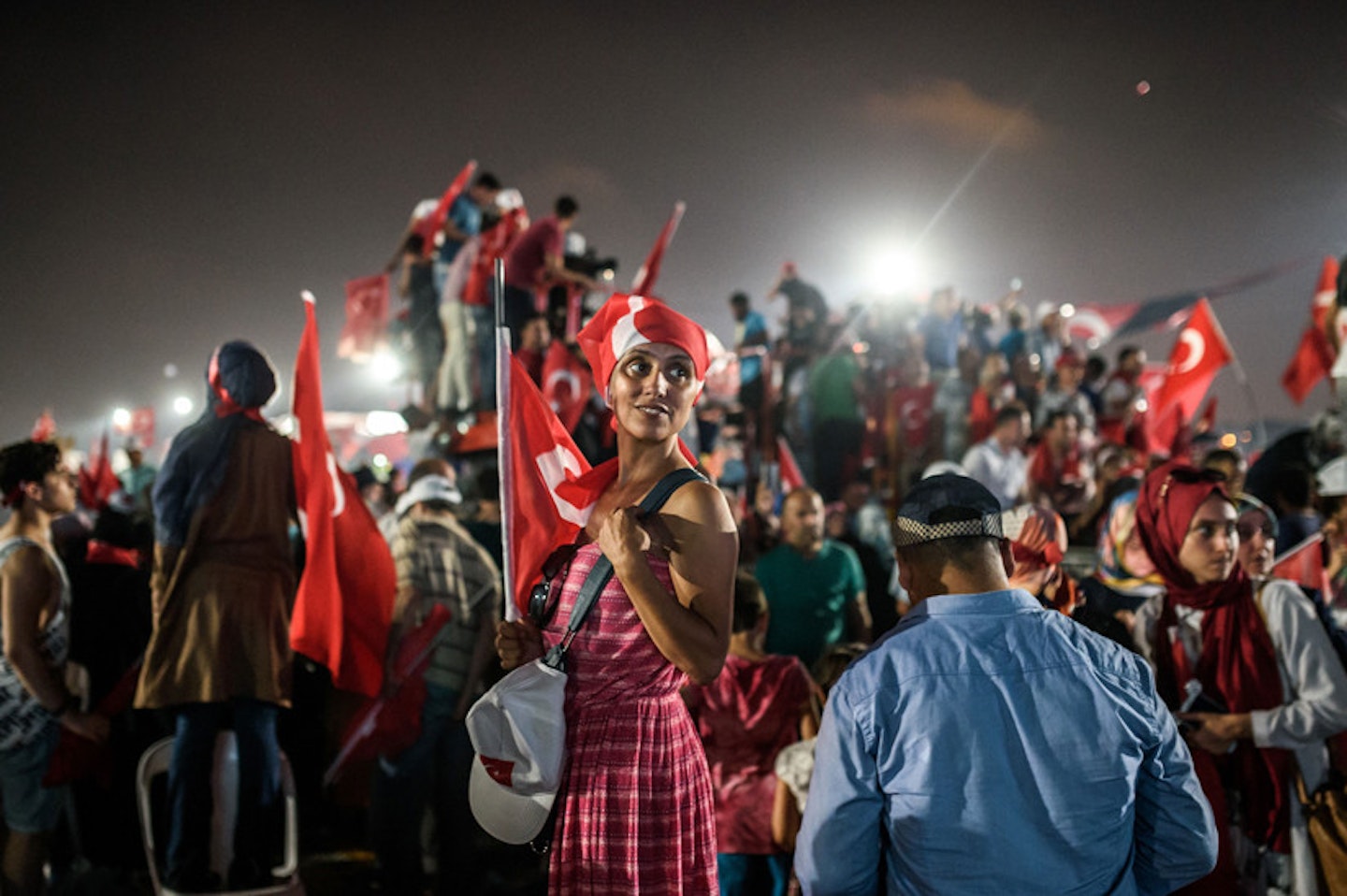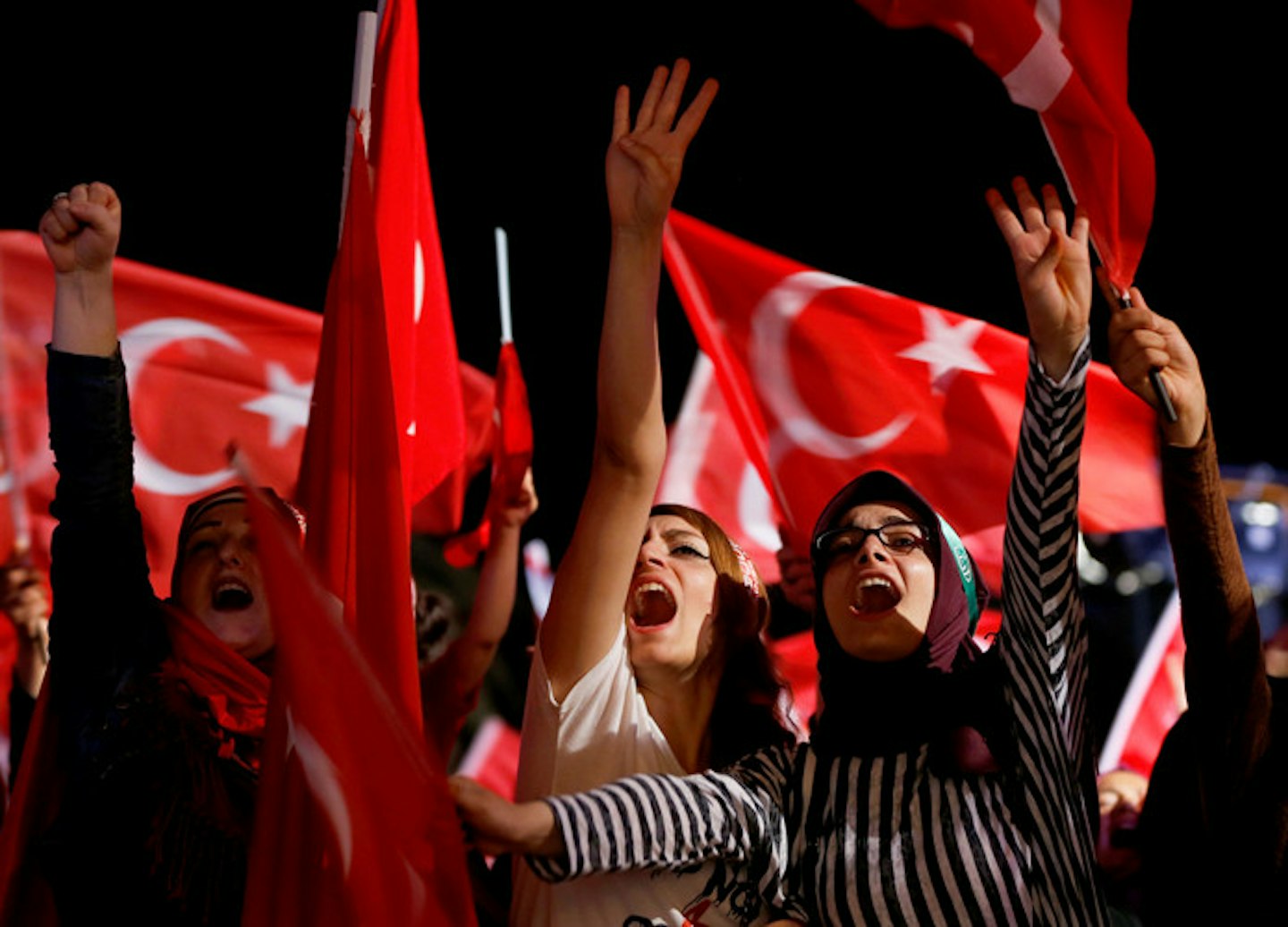There is a spot beneath Galata bridge, Istanbul, where fisherman straddle the space between boat and ground, passing freshly grilled fish with rings of white onion, pressed between bread to passersby. You can learn a lot about what it is to be Turkish here — well fed, animated, and welcoming.
But challenges are emerging for Turkey. Perhaps they were there all along. With the military on one end of the spectrum and the mosque at the other, where should modern-day Turkey position itself? Neither a European country nor an Arab one, this is a Muslim country in essence with a history of secularism. And, while the failed coup of 15th July saw religious and political views pitted against each other, there is another conflict going on within Turkey — a polarisation of gender, one caused by Erdoğan’s preference for traditional roles and which belongs to his own conservatism.

Sine is a 30-year-old artist. On that night in July she was in Cihangir drinking Rakı, a strong milky-coloured alcoholic drink that tastes of aniseed, with friends. 'We heard from our elders that during a coup they declare a curfew and we would have to stay at home. So we went to the market and bought pasta, wine and cigarettes for the day to come.'
While Sine and her friends were stocking up on essentials, a faction of the Turkish Armed Forces was attempting to overthrow President Erdoğan. It was a coup that failed quickly, and was largely believed to be the planning of self-exiled preacher, Fethullah Gülen, with whispers of turning Turkey into an Islamic state. It quickly failed, and lead to a massive crackdown and dismantling of the military, civil service and judiciary.
However, for many Turkish people the coup was not necessarily, on first hearing, a bad thing. Perhaps, people hoped, this would be the end for Erdoğan. 'When the lady with a blue jacket on TRT (a national television station) announced the coup d’etat we were screaming with joy and hugging each other. But I knew it’s not something good or progressive for the country. Yet, the idea of Erdoğan being gone was so charming that we felt ready for what might come — well, at least for that very moment.'
Yet, feelings about the coup were mixed. Yasemin, a 22-year-old psychology graduate tells me, 'a coup is never a good idea, so I feel relieved that it was not successful. But the purge that started after is a great sense of worry. I fear it will make the regime in Turkey even more oppressive and totalitarian.'
Eda, who is a 29-years-old senior communications specialist for a finance company, was having dinner in the Bosphorous area when people suddenly started leaving the restaurants. ‘There was a strange vibe’, she tells me, ‘and we checked social media and saw the tweets about the coup.' Social media played, at first, a huge part during the night. As did friends and relatives in other countries who had greater access to information, because Erdoğan’s AKP party locked down on media access, closing more than 130 outlets. 'It was like a war place,' Eda says, 'everyone was trying to catch a taxi in panic. It was one of the scariest nights.'
Ayşenaz, 32-years-old and a product designer from Ankara, now based in Istanbul, recalls being most intimidated by the ‘sela’s’; typically a call to prayer from the minarets, telling people that a member of the community has died. 'They were calling people out to the streets—' she says, 'I don’t think it’s right to engage people’s religious feelings in a situation like this. I thought, I hope this won’t end up in civil war.'
For many young women in Turkey it has felt like the country is dividing, in slow motion, for the last ten years. ‘There’s been a slow process of change that has been going on for over a decade now.' Yasemin tells me. 'The most obvious change in my environment is the way women feel in constant danger, both physically and emotionally. I feel the need to think three times about what I wear before I go out, to make sure it is not revealing in any way.' Sine makes a troublingly similar point, 'I cannot wear the things I used to wear and go out in the streets. I’m trying to be careful with my cleavage. But it wasn’t like this in certain areas in Istanbul before. It’s the most visible change I can feel daily.'
‘Strengthening the Family’ has become a catchphrase for AKP, and a move towards restrictions for women who value work as equal to motherhood, or more so. Is the fear related? I ask Yasemine. ‘It’s both the spreading oppressive violence, and objectifying ideology of the governing party' she says, ‘and the fact that our justice system fails to implement proper convictions.' This is an all too familiar story - sexual harassment is legitimised in society through a narrative that suggests women are worth less. Financial autonomy communicates a bodily worth. Without one, it’s almost impossible to achieve the other. 'Of course, there’s also the increasing emphasis on a woman’s place in work, by our President,' Yasemine says, 'or, to put it more accurately, the inappropriateness of it.'
Under Turkey’s current government, rape, sexual harassment, and the murder of women has risen at an overwhelming rate. In 2002, when still Prime Minister, Erdoğan’s message was clear: 'I do not believe in the equality of men and women. I believe in equal opportunities. Men and women are different and complementary’.
Women are exclusively referred to as mothers, and such a narrative only works to shoe-horn a woman as functioning, not existing — by its implied nature, belonging solely to a life of another.
Feride is thirty-three-years-old and works as a sustainability manager for a bank: 'The system is patriarchal.' she tells me, 'It was also like that before, but this time men are more appreciated and the government, and their opposition parties, are not good defenders of women. Civil society is doing a good job, but it’s not enough to change the mindset of the leaders.' Ayşenaz confirms the point: 'Men in general feel that they are entitled to oppress women. It’s no surprise that violence against women has risen 1,400 per cent during AKP’s rule.'
'Whenever there is crisis in political agenda, the government spin is aimed at women. Once, a government official mentioned that women should not laugh in public,' says Eda, echoing the story of fear and threat that is being told by all of the young Turkish women I have spoken to. 'The so-called ‘New Turkey’ is built upon a more authoritarian regime. Even though these facts are not announced by party representatives, you can feel it in everyday dynamics in the public sphere.'
Ayşenaz informs me that, 'another result of this conservative tendency is psychological. It’s there and it’s big. Every secular woman is worried about the future and the conservative direction we are going in. Most of the time the defendants of ‘namus cinayetleri’ (honour killings) get a reduction from their sentences because the judges think the women have provoked them.'
Though it has become increasingly difficult to challenge Erdoğan’s views — those who do are positioned as non-supporters of the state, a threat to the well-being of the country — there are also many people who won't be deterred. Sine says, 'Since the Gezi riots we’ve been named several different hate-words by our President, just because we support our rights for democracy and secularism. I was in the Gezi protests — the government had a direct affect in my life by throwing tear gas bombs and spraying me with water canon tanks.'
In March, days before International Woman’s Day, Ankara Women’s Platform refused to accept a ban prohibiting women from marching in celebratory parades. The given reason for the ban was that it was in the interest of ‘their safety’. Instead many women took to the streets, chanting in Turkish, Kurdish, and Arabic, 'The bans are yours, March 8 is ours.' Police eventually caved in, as groups of women increased in number, carpeting the streets with solidarity, singing and chanting: 'Found Prince Charming and decided not to marry, got pregnant, decided not to have the baby.'

This image is a huge contrast to the fearful bloodshed of the night of the coup, and a reminder of that sense of unity and unwavering knowledge of self, that is trying to be disintegrated amongst the Turkish people elsewhere. Whatever views Erdoğan and his government might hold of women, it seems he doesn’t know his own nation. There is an unfaltering strength and resilience that feels immovable. 'My reaction is to wear even shorter shorts, and confront the suspicious looks.' Ayşenaz says. 'The AKP government, and Erdoğan himself, never leave women alone. He declares things like how many children women should have. Women without children are considered only half a woman. Working women are not an ideal, because it keeps them away from being a mother' she tells me.
'Women shouldn’t laugh out loud in public, they should be humble. In short, they should fit into the conservative and male orientated idea of women — pious mothers of five, who do not work, who do not go out, and do as they wish. Well, fuck that.'

You might also be interested in:
Police At Turkish Pride Attacked Activists With Rubber Bullets, Tear Gas and Water Cannons
Roamin, Travellin, Learnin: Are Younger People Really Stronger In The EU?
Meeting The Anti-Muslim Hate Groups Who Love Donald Trump, Guns And Hating Islam
**Follow Chimene on Twitter @chimenesuleyman
**
Images: Getty Images
This article originally appeared on The Debrief.
